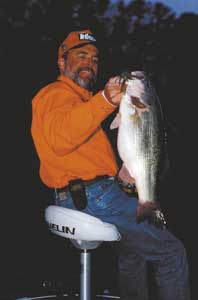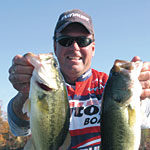
It can get pretty hot in South Carolina during the peak of the summertime. When I was much younger, I made a point of trying to avoid those broiling July afternoons, even if it meant changing my fishing routine. All I used to do in July as far as bass fishing was to go to Lake Murray or some of the other lakes at night. It’s just something I always did.
Scott Martin, my brother-in-law, and I would fish four or five nights a week and fish a weekend tournament at night almost every week through July.
Besides beating the heat, you beat the traffic. There sure wasn’t as much boat traffic at the major reservoirs in South Carolina 20 years ago as there is now, but it was still a good thing to get away from it all at night. And fishing after dark during the summer can be really good.
My normal approach would be to start at dusk, which would be around 9 or 9:30 p.m., and fish topwater plugs. I used several different kinds of prop baits, including a Devil’s Horse and a Nip-a-Diddee, and I would start by fishing main-lake points close to deep water, because you know the fish had moved out.
You’d fish the first little while with a topwater bait, and once the sun went all the way down, if you could keep catching ’em on a topwater, you’d keep throwing it. If the fishing slowed down, I would fish primarily a Texas-rigged plastic worm.
That sounds fairly easy, but there are three keys to really getting on it good — the size of the worm, the size of your sinker and the kind of worm you were fishing, the kind of tail it had.
I’ve caught bass at night during the summer with anything from a 6-inch worm to an 11-inch worm. When I start out, I experiment a lot with the size of the worm I’m fishing until the fish really tell me what they’re wanting — and that can change from night to night. It’s really, really, really important to experiment.
The things I think fish are concerned with are the kind of silhouette they see, the speed at which the worm falls, and the kind of disturbance the tail creates as it’s falling.
I’ll fish Berkley Power Worms, mostly in darker colors, because I think they work better at night. I like to fish black, black/blue, red shad and junebug.
As far as how fast a worm falls, you can control that with the size of the weight you fish. I might fish a 6-inch worm with anything from a 1/32-ounce worm weight to a 1/4-ounce weight and anything in between. The heavier the weight, the faster the lure falls. You have to experiment with the size of the weight just as much as you do with the size of the worm.
The kind of tail your worm has is something I pay a lot of attention to because I think bass feed more at night by sound, especially during a dark night. I’ll fish anything from a U-tail to a big snake-tail to a paddle-tail. Each one of them gives off a different kind of vibration, and that’s very important to figure out what the fish want after dark.
It’s all about experimenting, and I’m constantly doing that at night, with a handful of rods and reels at front deck of my Triton rigged with different worms and weights so I can switch without wasting a lot of time.
Most of the fish you’ll catch at night will be with a worm; it’s just a matter of experimenting and figuring out exactly how they want it.
Here are a few other things to consider:
— The place to really catch bass at night during the summer is a brush pile. They’ll really get on them after it warms up.
When Scott and I were fishing a lot at night, we’d try to fish 15 or 20 different brush piles every night. We also liked to fish main-lake points and points close to main creek channels.
— Moon phases are a something to consider. If you fish the whole month, you fish all stages of the moon. If you have only a few days to fish, like a lot of us have to do nowadays, I like to fish a couple of days before and after the full moon. The fish just seem to bite better, and it’s easier on you.
You’ve got enough light that once your eye gets adjusted, you can see what you need to see a lot easier.
— Fish defensively. What I mean by that is there are still enough boats on the lake at night that you need to be careful and make sure everybody can see you.
I keep my running lights on all the time, and I leave on my anchor lights. I also keep a strong flashlight in the boat that I can get to in a hurry in case I think a boat is going to come too close to me.
If you’ve got your running lights and anchor lights on, and a boat still looks like it’s going to come a little too close for comfort, I can flick on that light and warn ’em.
Davy Hite is a 40-year-old native of Saluda, S.C., who now resides in Ninety Six, S.C. He has fished professionally since 1993, when he qualified for his first Bassmasters Classic. He was the BASS Angler of the Year in 1997 and 2002, and he has won the 1999 Bassmasters Classic and the 1998 FLW Tour Championship. He is sponsored by Triton boats, Evinrude outboards, All-Star rods, Pfleuger reels, Pure Fishing (Berkeley), Owner hooks and Solar-Bat sunglasses.




Be the first to comment